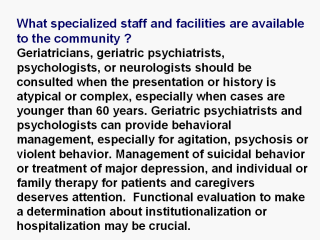 |
Neurologic consultation is particularly
important for patients with Parkinsonism, focal neurological signs,
unusually rapid progression or abnormal neuroimaging findings.
Neuropsychologists can help clarify uncertainties in diagnosis and the
degree and type of impairment, and clinical psychologists can provide
psychotherapy, particularly for caregivers. Social workers can offer
counseling and link patients and family members with community resources.
Activity and physical therapists provide guidance on appropriate levels of
physical and group activity, and occupational therapists can evaluate the
ability to perform activities of daily living and offer strategies to
maximize functioning. Attorneys can assist with wills, conservatorships,
estate planning and other legal matters. For end-of-life issues, some
families might also benefit from consultation with a member of the clergy or
a medical ethicist. Community support includes all locally available sources
of assistance aimed at maximizing patients' independent living and
functioning. The relief can be informal, such as neighbors and friends, and
formal. such as home care or family service agencies, the aging or mental
health networks, or adult day care centers. Physicians tend to be unfamiliar
with these approaches and may want to rely on the Alzheimer's Association or
an aging or social service agency familiar with the options. Availability of
community resources can be discussed during office visits.
|
